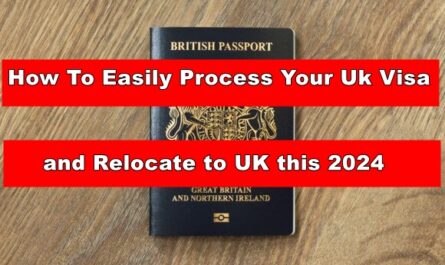Relocating to the UK as a student is not free; it requires funding, without which you cannot successfully find your way into the beautiful streets of the UK. Indeed, many people dream of studying in the UK, especially those who reside in the developing and underdeveloped world.
It can be difficult to take the step of relocating to the UK because you may feel bewildered and unsure of where to start or how much it will cost. If you are among those still getting worried about how much it will cost to relocate to the UK as a student, the good news is, worry no further, because this piece is for you, as it will explain what you need to know.
For a person who wants to relocate to the UK as a student, what you need to do first is consider getting admission to a university. The maintenance, or financial condition, states that you must have sufficient funds to cover your living expenses as well as your course fees if you are seeking a student visa. Typically, in order to demonstrate that you meet the financial criteria, you must produce financial documentation.
What are the financial requirements needed as regards relocating to the UK as a student?
Your financial proof must meet the exact financial standards in order to prevent having your visa denied. Prior to completing your online visa application, you must possess the required funds for the required amount of time. The Student Visa Guidance goes into great detail about the criteria for supporting documents.
How much exactly do you need to relocate to the UK as a student?
You need to have sufficient funds to cover the first year’s course fees. You must have the money to cover the whole cost of your course tuition if it is shorter than a year. The amount of your fee will be verified upon receipt of your confirmation of acceptance of studies (CAS).To receive a CAS, you would often need to submit a £4,000 deposit toward your tuition costs.
The £4,000 and any additional costs you have paid toward your tuition (if any) can be subtracted from the total amount you are required to present for your fees. Your CAS must reflect any payments you have made toward your course fees.
Cost of living
In order to support yourself while studying in the UK, you must have adequate money. And, there is no limit to how much you will need to relocate to the UK as a student. For a maximum of nine months, you will have to demonstrate that you have £1,334 for each month—or portion of a month—of your course. £12,006 is the most that you will require to cover your living expenses.
Whether you plan to live with relatives in the UK or have already paid for your accommodation in full or in part, the Home Office has established a fixed amount for the living expense criterion.You must examine your CAS to determine the duration of your course if it, or a portion of it, is shorter than nine months.
Determine the number of months and fractions of months left before the course finish date by looking at the CAS start date. If this is helpful, use a date calculator. Recall that you do not need to provide funds if you are applying in the UK and have been there for 12 months or more with authorization.
On the other hand, your tuition for a one-year Master’s program is £14,000, and you have already paid your £4,000 deposit and an additional £2,000 toward your studies.You have to provide evidence of £12,006 (1334 x 9 months) for living expenses and £8,000 (£14,000, £4000, and £2000) for tuition.
You must present a total of £20,006 (£8,000 + £12,006) for upkeep.Moreover, for living costs, you must demonstrate that your living expenses will not exceed £12006 (£1334 × 9 months) if you plan to enrol in a three-year undergraduate program.If you are a current student with three months left in your study and are not exempt from the previously stated financial requirements, you will need to provide proof of your living expenses in the amount of (£1334 x 3) £4,002.
Key things you need when relocating to the UK as a student
- Visa: A student visa is the first and most crucial need when moving to the UK to pursue your education. This is due to the fact that you won’t be able to enter the country without a student visa.It’s usually the next thing you should do after making your first deposit. The UK Visas and Immigration website is where you may submit an application for a student visa.Next, schedule the day of your appointment. Verify that you possess all required paperwork, including a current passport, CAS number, and evidence of financial assistance.
- Accommodation: Securing appropriate housing is an additional vital component of moving to the United Kingdom. You have the option of living on or off campus, according to your financial situation and preferences. While living on campus can occasionally be more expensive, it’s a beautiful opportunity to meet new people and is quite convenient.Although living off campus can be less expensive, you’ll need to account for other expenses like transportation. It also depends on whether your school is situated in a pricey metropolis like London or a more reasonably priced region like Leeds. Make sure to start looking for a place to live as soon as possible, and don’t be afraid to ask the housing staff at your university for guidance.
- Your travel documents: When moving to the UK, don’t forget to pack all the required travel documents. This contains your student visa, passport, and any other pertinent paperwork, including your university admission letter. Make copies of these documents so you have a backup copy, and store them in a safe location.
- Student Identification Card: Throughout your academic career in the UK, your student ID card is a crucial piece of evidence that you will require. In addition to giving you access to the library and computer laboratories at your university, it could also give you savings on other services like transportation. As soon as you arrive on campus, make sure you apply for your student ID card.
- Opening up a bank account: It is imperative that you open a bank account in the UK, particularly if you intend to stay for a long time. While you’re in school, having a UK bank account will make it simpler for you to handle your money, pay your bills, and receive money from your family or job.
We advise creating an account that enables you to convert money from your home currency to GBP quite quickly. Therefore, with a foreign bank account like Grey, you can effortlessly receive money from your family in Nigeria or even transfer money home.With Grey, all you need is confirmation of identity and address, such as a power bill, unlike other banks that will demand that you physically visit them.
The fact that Grey offers better currency exchange rates and lower foreign transaction costs than other solutions is another reason to go with it. Furthermore, you can open one before moving. Find out more about its operation here
6. Health insurance: Having health insurance as an international student is crucial to paying for any medical costs you could have while studying in the UK. You have two options: enroll in the National Health Service (NHS) or buy private health insurance.
Some of the perfect places to live in the UK include – the Isle of Skye (Scotland), Bath (Somerset), Kew (London), Seaford (East Sussex), Polperro (Cornwall), and Edinburg (Scotland).
How much does a student who wants to relocate to the UK pay?
UK tuition fees are often a contentious issue, as costs for domestic students (those in the UK or EU) have skyrocketed in recent years. In 2017, it was mandated that students from the UK and EU attending English universities pay up to £9,250 (~US$13,050) annually. The cost of an international undergraduate education varies greatly, ranging from approximately £10,000 (~US$11,415) to £38,000 (~US$43,378) or more.
Humanities and social science degrees are typically the least expensive at all levels, while laboratory and clinical degree programs are significantly more expensive. However, when you factor in these costs along with the average annual cost of living in the UK, which is approximately £12,200 (~US$13,926), it can be difficult to see how studying in the UK is possible without breaking the bank. According to estimates, studying in the UK should cost at least £22,200 (~US$25,339) a year, with London likely to be much more expensive.
Conclusion
Conclusively, knowing how much you need to relocate to the UK as a student is important so you can save up for your expenditures. Although relocating to the UK on a student visa can appear difficult, it can also present an exciting chance to get to know a new nation and its culture.


